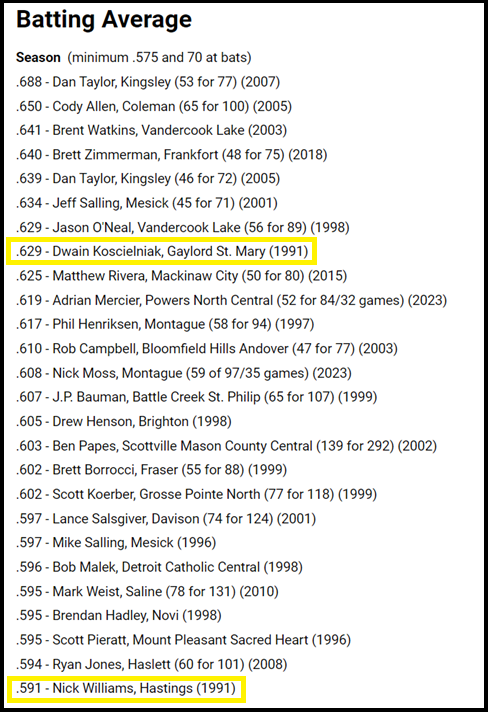
Similarities Tie Slugging Pair's 1991 Pursuit of .600 Average, Paths After
By
Steve Vedder
Special for MHSAA.com
June 11, 2024
They both remember chasing the identical goal 33 years ago.
It wasn't so much that Hastings' Nick Williams and Dwain Koscielniak of Gaylord St. Mary were aware in 1991 of becoming the first MHSAA-recognized .600 hitters in state history. What the two remember most about their magical final high school seasons has little to do with records, but simply closing out outstanding baseball careers with a bang.
"I think it was the same scenario for both of us," Williams said. "You just want to get a hit, drive the ball every time you're up."
It may be forgotten now, but in an era where tracking batting averages wasn't as simple as inserting a thumb drive and a couple clicks on a laptop, it's easy to see how the one-of-a-kind hitting exploits of Williams and Koscielniak may be overlooked. For instance, with just days left in their senior seasons neither knew they were closing in on the state record for batting average of .577 by Greg Atkinson of Maple City Glen Lake in 1985. The two were more focused on helping their teams win District titles and then beginning their summers.
About all the pair really knew was that magical seasons were about to end. Both were batting over .600, but when ballplayers are hitting that well, there's a fine line in maintaining such rare territory. As both found out – one painfully so and the other happily – every at-bat is critical. Koscielniak wound up slugging a pair of homers in his final game to finish with a .629 mark while Williams, who started the last day of his senior season with a hefty .612 mark, went hitless for the first time all spring to finish at 591.
While the chase to hit .600 is obviously an entertaining story, it's only the tip of the iceberg in terms of the amazing parallels between the lives of Koscielniak and Williams, who lived 170 miles apart growing up in Gaylord and Hastings, respectively.
Both, for example, were outstanding dual-sport athletes. Koscielniak graduated second on the Michigan football career rushing list with 5,078 yards from 1987-90, and he still owns the state single-game record of 529 yards against Pellston on Oct. 26, 1990. Williams, meanwhile, averaged 24 points per game as a senior in basketball and could have been a dual-sport athlete at the next level if not for sticking with baseball.
In addition, both went on to stellar collegiate careers. Williams was a second-team all-Mid-American Conference selection in 1995 as a junior, and Central Michigan University captain as a senior. Koscielniak played two years at Mott Community College before becoming a slugging catcher/infielder at Ferris State. He was named Player of the Year in the Great Lakes Intercollegiate Athletic Conference in 1994 when he won the league’s triple crown hitting .403 with nine home runs and 37 RBIs.
 Both had flirtations with pro ball as Williams was taken by the Seattle Mariners in the 48th round of the 1991 MLB draft and later drew interest from Boston and Cincinnati following his time at CMU. Koscielniak was drafted by San Diego in the 32nd round in 1994 and reached High-A a year later. He batted .261 with 32 RBIs in 64 games over two minor league seasons.
Both had flirtations with pro ball as Williams was taken by the Seattle Mariners in the 48th round of the 1991 MLB draft and later drew interest from Boston and Cincinnati following his time at CMU. Koscielniak was drafted by San Diego in the 32nd round in 1994 and reached High-A a year later. He batted .261 with 32 RBIs in 64 games over two minor league seasons.
Koscielniak and Williams, who unknowingly played against each other with their college teams in 1994, also both wound up in athletics after college. Williams became an associate athletic director at Central Michigan, while Koscielniak coached baseball at Gaylord St. Mary.
There's more as both players are fathers of college-level talents. Williams' daughter Jayden ran track at Central Michigan while another daughter, Taryn, is playing volleyball at Delta College. Koscielniak's sons Steven and Christopher both played baseball at Delta College, daughter Brooke is an equestrian at Saginaw Valley State, and youngest son Brett is a three-sport athlete at Gaylord St. Mary.
If there's one more nugget which Williams and Koscielniak have in common, it’s that both credit long hours of work for becoming outstanding hitters. Williams would use a tarp in the family garage for a makeshift hitting cage, while Koscielniak's offseason hitting quarters was a cage stuck away in a pole barn. Both said they would never have approached being .600 hitters without putting in loads of extra time.
"I got my swings in several times a week in the offseason, and that really helped me," said Koscielniak, whose professional career received its earliest spark when a Ferris State science teacher/part-time MLB scout wandered past the school's gymnasium and noticed Koscielniak practicing throws to second base from his spot as catcher during winter workouts.
Williams remembers getting in about 200 at-bats with summer travel teams in Hastings, Grand Rapids and Battle Creek between his junior and senior years.
"I had a lot of success as a hitter because I put the time in," said Williams, who remembers half a dozen scouts at every Saxons game as a senior. "I didn't play a fall sport, and I put in a lot of time just hitting. I became aware of being able to hit the ball the other way, and I think my confidence began to grow."
As for approaching the .600 mark during their final seasons, Williams and Koscielniak said they were blissfully unaware of any state batting records. Williams does recall never considering trying to preserve a .600 average by taking a game off down the stretch.
"No, I never (had) a thought of that – not even a conversation," he said. "A lot of time has passed since then, but I don't remember sitting out at all. No way. I was always going to play, and that's it."
Koscielniak also doesn't recall worrying about hitting 600. While Koscielniak was the first .600 hitter in state history, only 17 others have gone on to become MHSAA-recognized .600 batters. Dan Taylor of Kingsley holds the state record for highest average with a .688 mark in 2007.
Koscielniak also hit 17 home runs as a senior and finished his career with 35, which continues to rank eighth on that statewide all-time list.
"Back then if you loved the game, you just played. How it turned out for me is how it turned out," he said. "I was competitive and played hard. I played well at Mott and then Ferris State, and the door opened up for me a little."
Williams and Koscielniak remember one huge drawback in trying to hit .600: walks. Pitchers would simply not give them anything to hit. Williams remembers a doubleheader against Coldwater where he hit home runs in his first at-bats in both games, then received two intentional walks in both games. Koscielniak's two homers in his final game were followed by two intentional walks.
Such a stingy pitching philosophy was par for the course, they say.
"That becomes very difficult for a hitter," Williams said. "You have to be dialed in when you get your opportunities. It was a fun year for me, but a struggle at times because (the walks) make you feel like you're not doing your job for the team.
"I don't think hitting .600 was a big deal. We didn't talk about stats and those things. You keep track a little, but I had no idea till the end of the year. And in the end, it's not about stats. I loved playing baseball."
These days, Williams is an instructor as part of the physical education and sport faculty at CMU, teaching courses on professional and collegiate athletics. Koscielniak is an operation manager for Schwan’s Food Service and with his wife Liz owns the Gaylord Equestrian Center.
PHOTOS (Top) Dwain Koscielniak, left, and Nick Williams stand for recent photos; they were the state’s top high school hitters in 1991 as both pursued a .600 batting average. (Middle) They continue to rank among the elite on the MHSAA record book list for top batting averages for a single season. (Photos courtesy of Koscielniak and Williams.)
State Champs! Sports Network: Baseball Extra Innings Episode 2
April 12, 2024

